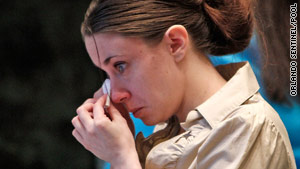

(CNN) -- Casey Anthony will face the death penalty, a Florida judge ruled, rejecting defense arguments that capital punishment in her murder case was sexist and unduly harsh.
Judge Belvin Perry Jr. also rejected defense arguments that prosecutors were seeking the death penalty as a means to bankrupt Anthony's defense.
The judge did grant one defense request -- that prosecutors disclose evidence supporting the aggravating factors they intend to cite if Anthony is convicted of premeditated murder and they ask jurors to return a death sentence.
In death penalty cases, jurors are asked to weigh aggravating circumstances that make a crime especially heinous against mitigating factors that favor the defendant, such as a lack of prior offenses.
Anthony, 24, is accused of killing her daughter, Caylee, who was 2 when she disappeared in June 2008. Caylee's body was found that December in a vacant lot near the Orlando, Florida, home where she lived with her grandparents.
Casey Anthony's trial is scheduled to begin on May 9, 2011.
The defense maintains that prosecutors had originally said they would not seek death in the Anthony case but reversed that position in March 2009 when they learned that Anthony had $205,000 for her defense.

Video: Casey Anthony still may face death
RELATED TOPICSThe bulk of the money came from ABC News for the licensing of photos and videos, Baez testified during a previous hearing.
"The court has the authority to bar the death penalty where the prosecution exercises its discretion in bad faith, for impermissible motives and in order to prevent the defendant from exercising her constitutional rights," the defense argued in court papers.
Judge Perry denied the motion, saying that judges are prohibited under Florida law from interfering with the state's decision to seek death. Although one exception includes circumstances in which bad faith can be documented, Perry said Anthony's defense had not proven bad faith.
The defense also argued that prosecutors sought the death penalty against Anthony because she is a woman, and that focusing on Anthony's lifestyle before she was arrested is gender bias.
Defense witness Elizabeth Rapaport, a University of New Mexico law professor and author, testified that the lifestyles of white middle-class mothers charged with killing their children receive much more media attention than those of defendants in other cases.
Under questioning by Anthony attorney Andrea Lyon, a nationally known death penalty expert, Rapaport said a mother perceived as "deviant" by a jury has a more difficult time defending herself.
Anthony teared up when Lyon noted in court that despite her client's "party girl" reputation in the media, most of the witnesses have acknowledged that "Caylee was happy and healthy."
"Do you have any evidence that there is gender bias in this case?" prosecutor Jeff Ashton asked Rapaport in cross-examination. The witness responded that she didn't know much about this case and had only read a few press reports.
The defense argued that Anthony is facing more serious charges and harsher punishment than a man in the same position would receive.
Responding to Ashton's questions, Rapaport said that men who kill their children usually are acting in a rage.
Women, Ashton argued, tend to premeditate a child's killing and have underlying psychological issues. Cases in which women kill without evidence of psychological disturbance are rare, he added.
"In my 30 years" as a prosecutor, Ashton said, "this is the first time we have had the evidence for the jury to determine if death is the appropriate penalty."